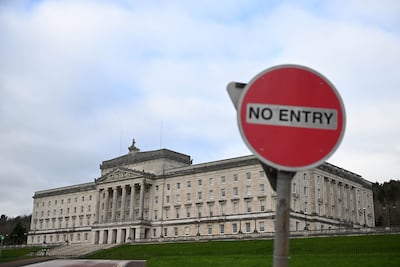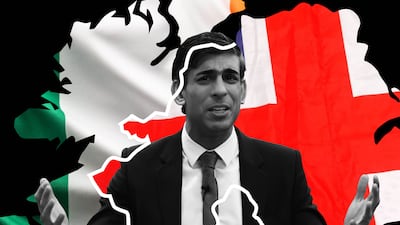This week UK Prime Minister Rishi Sunak secured a negotiated agreement with the European Union over the Northern Ireland Protocol. His supporters have heralded the achievement as a statesman moment, and early indicators show little sign of a rebellion within his Conservative Party – given the party’s penchant for coups, this alone is a significant feat.
But while the headlines home in on trade, the primary issues at the heart of the dispute over the Northern Ireland Protocol are rooted not in customs checks, but rather in the concept of identity. In a contested political state dominated by identity politics, the challenges in Northern Ireland have always been about something much deeper.
The negotiated resolution, titled the Windsor Framework, aims to address barriers to trade between Northern Ireland and the rest of the UK, while also addressing constitutional issues brought up by Northern Ireland’s Democratic Unionist Party. The forced reworking of the UK’s post-Brexit trade agreement was triggered by unionist discontent in Northern Ireland, which ultimately resulted in the collapse of the region’s political institutions in 2022. Although the DUP, and many unionists, point to the Northern Ireland Protocol as the source of political instability, Brexit was in fact the catalyst, and no new agreement can square the destabilising effect it has had on Northern Ireland’s delicate equilibrium.
Historically, Northern Ireland has been divided into two main communities – unionism, which favours remaining a part of the UK, and nationalism, which favours Northern Ireland reunifying with the Republic of Ireland. Balancing these opposing political aspirations is a cornerstone of the Good Friday Agreement, and it is here where Brexit creates tension.

Following the 1998 Good Friday vote, border infrastructure and barriers between Northern Ireland and the Republic of Ireland were removed. Today the only indicators that you’ve crossed into a separate legal jurisdiction is a change in the road markings or a “Welcome to Ireland” phone notification. This open border also opened minds, facilitating free movement and allowing people to put a body of water between themselves and the violent history of the 30-year conflict that precipitated the Good Friday Agreement. Equally, free movement between Northern Ireland and the rest of the UK was seamless, with no barriers or infrastructure delineating a physical distinction.
The complexity of Northern Ireland, and this balance of relationships between the Republic of Ireland, Northern Ireland and the rest of the UK were all-but-absent from the Brexit debate, even though Northern Ireland would be the most impacted should the UK vote to leave the EU. Brexit means borders, and following the 2016 vote, the borderless existence that the people of Northern Ireland had been living in since 1998 was always going to end, despite largely voting to remain a part of the EU.
The return of a border on the island of Ireland was never going to happen. Logistically, it would be nigh impossible to protect the EU single market via a complex stretch of land with over 300 crossings, and a border that runs through villages and, in some cases, backyards. Enforcing a hard border would also have had a significant mental and emotional impact on communities in Northern Ireland and the Republic of Ireland. The return of its accompanying infrastructure would represent, for many, a return to a painful past.
It was unsurprising, therefore – given the UK’s decision to opt for a hard Brexit removed the country from the EU single market – that a new border would be established between Northern Ireland and the rest of the UK primarily through the use of seaports. Infrastructure at the ports is far less visible and invasive, but creating a system of checks for goods moving between two parts of the United Kingdom impacted Northern Ireland’s unionist community, many of whom argue this creates a separation between themselves and those residing in the rest of the UK.
For Northern Ireland’s DUP – the largest unionist party – the creation of the Irish sea border, as it has become known, has been an unpleasant experience. The party was the only major one in Northern Ireland to support Brexit, and there is a strongly held view that many within the DUP had hoped that Brexit would restore a hard border on the island of Ireland. Given that the party had openly campaigned against the Good Friday Agreement, this view carries merit. The fact that the border ended up between Northern Ireland and the rest of the UK left the party feeling deeply betrayed by the UK government, thus opposition to the Northern Ireland Protocol was born, spearheaded by the DUP who rather successfully injected identity politics into the heart of what was legally, and at its core, a trade agreement.
The vote to leave the EU has fundamentally altered the social and political landscape of Northern Ireland, as well as its future. For many, the knowledge that Northern Ireland constitutionally retains a pathway to return to the EU by voting to reunify with the Republic of Ireland became an increasingly appealing notion. In October, thousands of people from across the island of Ireland filled the 3 Arena in Dublin for the largest conference on a United Ireland in history, with 10 political party members participating – five of whom, party leaders – marking a moment of living history, and a definitive signal of intent politically.
As people in Northern Ireland and the Republic of Ireland begin to engage and consider a United Ireland in a way they hadn’t previously, unionism as a political identity has become increasingly weakened. Once the dominant political force, unionism lost its majority in Northern Ireland’s political institutions for the first time in 2017, followed by unionists losing their majority at Westminster in 2019, and subsequently losing the office of First Minister of Northern Ireland in 2022.
Brexit has made Northern Ireland’s future uncertain, most likely bringing the possibility of the North voting to leave the UK forward by a generation at least. This uncertainty, compounded by consistent political decline, is a key driver of unionist opposition to the Northern Ireland Protocol – new trade and customs arrangements between the UK and EU are not going to resolve this undercurrent.
Northern Ireland has been without a functioning government for over 12 months down to the DUP’s abandonment of the power-sharing institutions. Since then, reports have suggested a wane in support within unionist communities for the Good Friday Agreement, but this also correlates with a marked increase in people discarding unionism as an identity – Northern Ireland is no longer two main communities, but three, with an ever-growing cohort forming the last group, who describe themselves as neither unionist nor nationalist. This is in tandem with a decline in those describing themselves as British, with the 2021 Northern Ireland census highlighting an 8 per cent drop in British identity over the past 10 years, while those describing themselves as Irish increased. The landscape has fundamentally changed at pace.
It is expected that Mr Sunak will push through the new Protocol arrangements in the coming weeks, addressing some of the key trading challenges Northern Ireland has contended with, affording the North a unique and potentially economically beneficial opportunity. As he said in Belfast on Tuesday, implementing the Windsor Framework would "create the world's most exciting economic zone", making Northern Ireland enormously attractive for investment.
But this was never about trade – not really. The deal may, with any luck, restore the power-sharing institutions, but the future of Northern Ireland is in no way certain.


